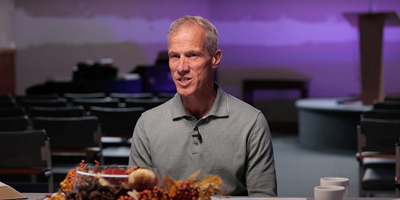The English word “worry” is a synonym for anxiety and comes from an old German word meaning to strangle. Looking at the root of this word is helpful. It pictures worry and anxiety as a type of choking, which causes mental and physical problems.
Should Christians experience anxiety if they trust in an omnipotent and all-loving heavenly Father? There is a variety of thought on this issue. One person might say, “All anxiety is sinful and demonstrates a lack of faith”, while another would state, “Well, it is in our nature to get anxious, so we have to just accept that as a fact”.
Others that I have met believe the antidote to anxiety is either detached disinterest or denial. These are used as coping mechanisms, but they eventually fail when the circumstances worsen. “Whatever will be, will be”, is the anthem of many as the way of dealing with problems and concerns.
Believers have something far better; a relationship with a heavenly Father who cares for them (1 Peter 5:7). The Gospel offers real hope and comfort.
Anxiety: Right or wrong?
There is an anxiety that stems from a lack of faith in God. Continually doubting His care, control, concern, or compassion will mean needless and sinful anxiety. If I believe that He sent His Son into the world to take the punishment that my sins deserve how can I doubt His care for me? Yet anxiety reveals the fact that I am doubting that care.
If God is in control, then I can trust His plan. When my plans must change, I do not need to be anxious, but I can remember it is all in His hands. Nothing takes God by surprise, there is never an unexpected event and He does not need to change His plan. I can rest in His providence; meaning He is in charge of everything that has happened, is happening and will happen.
Many people sinfully worry about the future: Will they be healthy? Will they marry? Will they have children? When will the COVID-19 pandemic end? It is this type of anxiety that the Lord Jesus addressed when he said:
“Therefore do not worry about tomorrow, for tomorrow will worry about its own things. Sufficient for the day is its own trouble” (Matthew 6:34).
The Lord Jesus also commanded, “do not seek what you should eat or what you should drink, nor have an anxious mind” (Luke 12:29). It would seem, based on these statements, that all anxiety is wrong and thus sinful.
Yet we see the Apostle Paul speak of his “anxiety for all the churches” (2 Corinthians 11:28 ESV). So, is there a correct type of anxiety?
If we consider the example of Paul, we can draw the conclusion that there is a right kind of anxiety that comes from a loving concern for others. He was deeply concerned for the spiritual wellbeing of others. Paul felt a constant internal pressure for the churches. There was concern, stress, and anxiety when he thought about them. However, this did not drive him to useless self-dependence but to dependent prayer. His letters are full of prayers for the churches. Anxiety about a situation drove him to a greater dependence on God. He did not cling onto his anxiety but took it to the Lord.
Paul, by inspiration of the Holy Spirit, wrote one of the best-known texts on anxiety:
“The Lord is at hand. Be anxious for nothing, but in everything by prayer and supplication, with thanksgiving, let your requests be made known to God; and the peace of God, which surpasses all understanding, will guard your hearts and minds through Christ Jesus” (Philippians 4:5b-7).
Surrounding the command not to be anxious are three consolations for anxious people that will enable them to deal rightly with anxiety.
The Lord is near to you.
This first consolation is not often included when this scripture is memorised, but it is hugely significant. When there is unhealthy anxiety, we have undoubtedly forgotten that the Lord is near. We will be living as if it is just us against our struggles and concerns. We are without help and comfort, hoping to cope on our own.
Remembering, even in the worst circumstances, that the Lord is near will ensure there is a hope that is bigger than any trouble, even death itself. We can draw close to the Lord who is near. When we believe and trust that Jesus is near, sinful anxiety dissolves and trusting anxiety grows.
The Lord will listen to your prayer.
In times of trouble, when there are concerns and anxiety, we can pray. Not to a God who is distant and disinterested but to one who is near and cares. Prayer is not a magic formula but sincere heartfelt prayer is the antidote to worry and the cure for anxiety. It is not that anxiety won’t return, but it’s an ongoing experience of the Christian life to bring those troubles to the Lord. We must never let prayer be the last resort when all else fails but rather make it the first port of call when concerns come.
An attitude of self-dependence will mean struggling with the problem ourselves, causing needless anguish and worry. Dependence on the Lord means we can cast our burdens onto Him, leaving them there: “casting all your care upon Him, for He cares for you” (1 Peter 5:7).
The fact that our caring and compassionate Lord delights to hear our prayers does not mean the circumstances will change but it does mean He will provide comfort, strength, and hope through the difficulties.
The Lord will provide you with peace.
The third consolation is a promise of peace to all who bring their concerns and worries to the Lord. Anxiety can cripple the mind and the heart. It suffocates mentally and emotionally, even causing irrational thoughts and erratic behaviour.
God promises to provide peace that will guard our hearts and minds. The idea is drawn from a soldier guarding something valuable. God’s peace will ensure we do not allow sinful anxiety to have a resting place in us. It is the guard we need in times of anxiety.
The writer of Philippians 4:5b-7 experienced great difficulties but knew the peace that only God can provide. God’s peace does not mean the absence of trouble but rather a calmness and confidence in Him during the trouble.
The scriptures inform us that: “Anxiety in a man’s heart weighs him down, but a good word makes him glad” (Proverbs 12:25 ESV).
May the Word of God itself be the word that brings gladness to anxious souls.
























